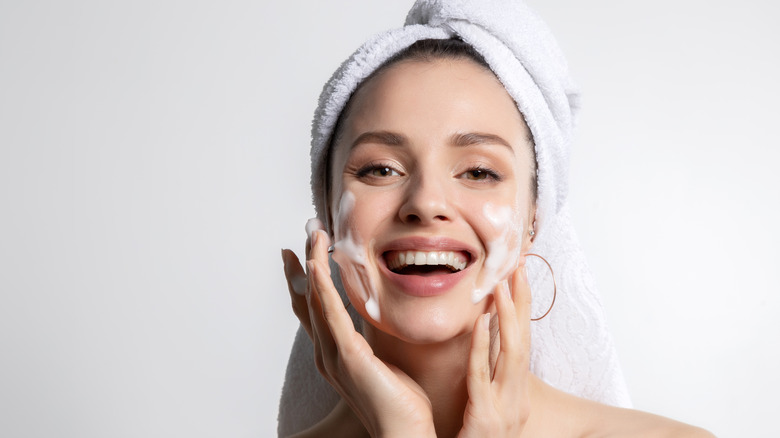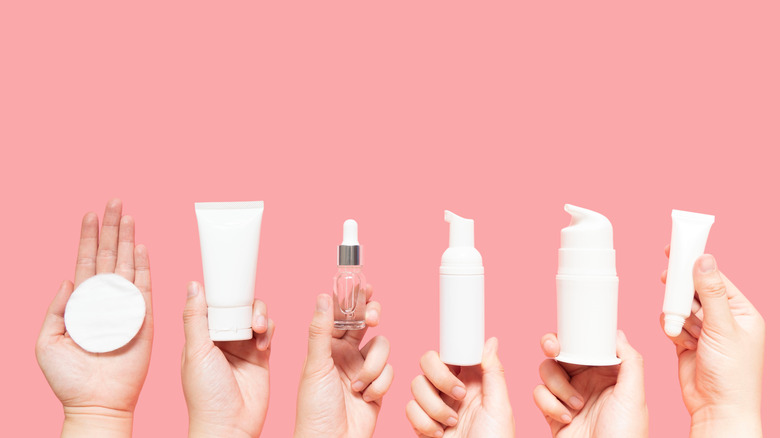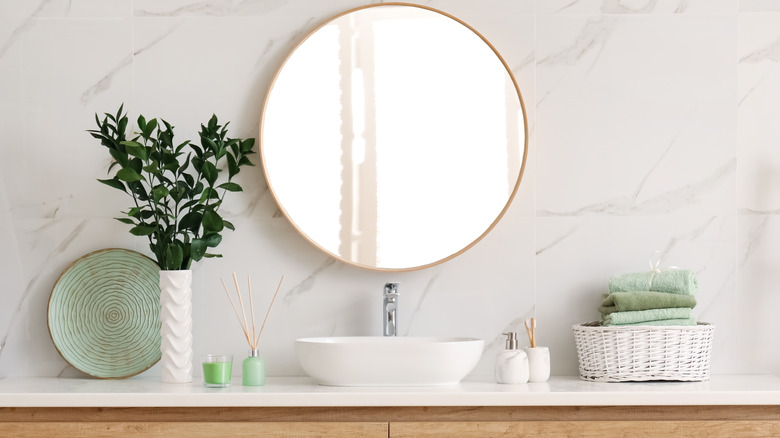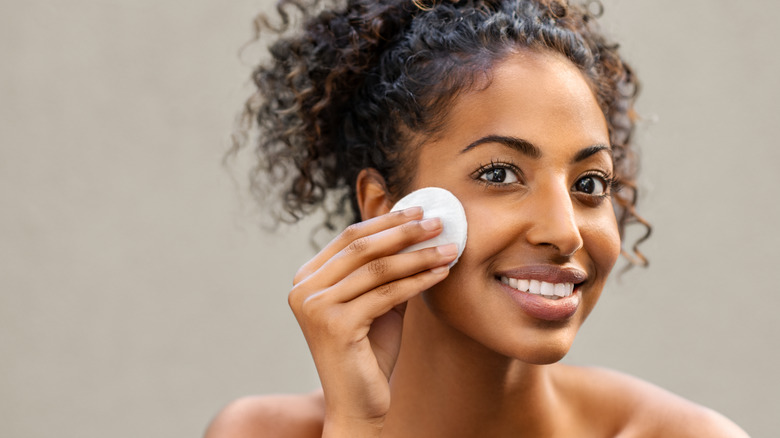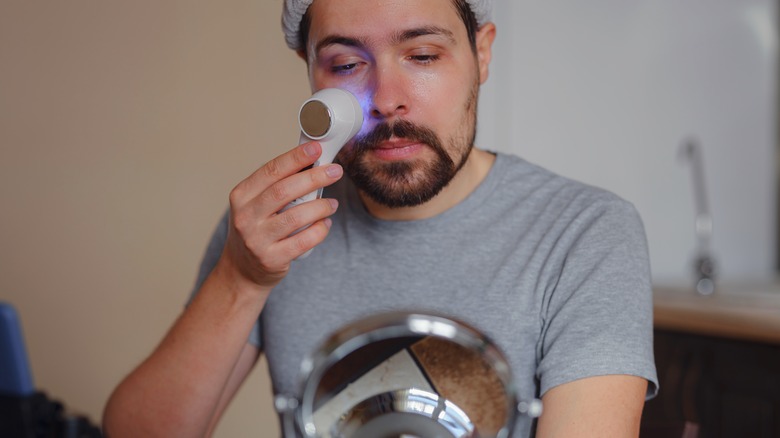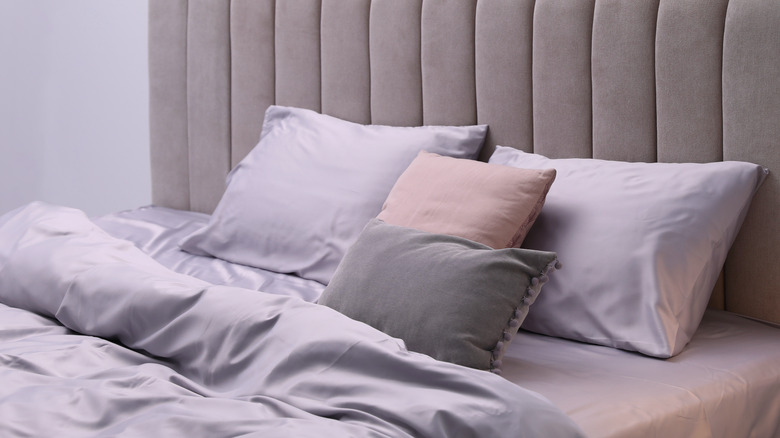How To Wash Your Face For Healthier Skin
What if you finally knew the secret to washing your skin the right way? There's no magic wand for perfect skin, but there are plenty of healthy habits you can incorporate into your daily routine to keep your skin at its best. If you don't currently practice positive habits when it comes to your face, it's never too late to start.
Everyday Health reports that 80% of people in the United States aren't washing their faces correctly and performing at least one unhealthy facial cleansing mistake. Additionally, approximately 50% of people skip nighttime cleansing. While we've all had nights where we've been too tired to carry out our evening hygiene routine, regularly plopping an uncleansed face onto your pillow for eight hours every day can do far more damage when it comes to clogged pores, creating a build-up of dirt, and the spreading of bacteria. Knowledge is power, and knowing how to wash your face and keep your skin healthy will improve your complexion (per Self).
From holding your phone up to your face to free radicals and pollution in the air around you, there are numerous factors that contribute to bacteria, oil, dirt, sweat, and more piling up on your skin, per Women's Health. Washing your face is paramount in removing debris from skin that could lead to breakouts and premature aging (via Everyday Health). When you clean off factors that can create dullness, like dead skin cells and dirt, you're left with a more radiant complexion.
Know your skin type
While there's no singular way to wash your face that works for everyone, knowing tips for cleaning your specific skin type is a great place to start for achieving a healthy complexion. Skin types are placed into five categories: normal, oily, dry, combination, and sensitive (per CeraVe). Determining your skin type, which may require assistance from a dermatologist if you're uncertain, can then help you decide which products you should have on hand to cleanse your face each day, and which products you should avoid, advises Self.
Once you know your skin type, you can choose products that will work best for your face, adds Self. If you have dry or sensitive skin, you'll want to go with gentle cleansing products and likely products that are fragrance-free. Water-based cleansers are often recommended for people with normal skin, while sensitive or dry skin may require a cleanser with moisturizing properties. People with oily skin may opt for gel or foamy cleansers.
No matter your skin type, using a bar of soap to wash your face can strip your skin of its hydrating properties and make your skin prone to inflammation and dryness. If soap is your only option for cleansing your face, try to find a gentle option. Another tip for being kind to your skin is to never wash your face with hot water. For all skin types, lukewarm water is recommended as the best temperature for cleansing your face.
Become a minimalist
Maintaining a regular facial cleansing routine can be difficult if you're surrounded by clutter, both physical clutter, and in the amount of products you're putting on your face. Remember that you don't need to purchase every product you see advertised with the benefits of clearer skin. In fact, you should stick to as few products as you can that will refresh your skin. Per Insider, if your skin feels sticky after you apply products, products don't fully absorb, or a product isn't necessary for your skin, then you may be using excess products.
When it comes to choosing facial cleansing products, most people are inundated with advertisements for more items than they can count. According to Statista, the estimated amount of money spent on beauty and personal luxury advertising in 2021 was approximately $7.5 billion, and that's just in the United States! All to say, you don't need to have your bathroom cluttered with too many products. Instead, get rid of the products you don't need (per Elbow Room).
Try sorting your products into morning and evening groups, for instance placing your SPF products on the morning side for easy access when you're groggily walking into the bathroom first thing in the morning. When the products you use are readily available to access and you aren't stressed out by clutter, washing your face will be easier, and so will sticking to a routine.
Don't be lazy
It may be tempting to simply wipe your face instead of fully washing it, or to skip washing altogether, but when it comes to the skin on your face, good hygiene is imperative, especially at night. The nighttime wash is critical because it rids your face of all of the sweat, dirt, bacteria, and oil that accumulates during the day, says Self. Even though it's recommended that most people wash their face twice per day, usually morning and night, if you only have time to wash your face once a day, always go with the evening.
For people with very sensitive skin types, doing a water rinse for the morning cleanse can be effective since using a cleanser multiple times a day may irritate existing sensitivity. However, people with all skin types should use an appropriate cleanser at night.
Makeup-removing wipes can be an easy way to take makeup off and can leave your skin feeling cleaner, but they're not a substitute for washing your face. Dermatologist Dr. Rachel Nazarian tells Self that, "The cloths are formulated with many preservatives that allow them to be shelf-stable and sit in your bathroom without growing bacteria and fungus. Although they remove makeup and dirt, they also leave behind a residue." An alternative is using reusable makeup rounds that can be washed. Either way, you should always wash your face after using makeup remover to get rid of the residue and lingering dirt, bacteria, and other agents.
Don't overdo it
It might be tempting to put every type of serum, moisturizer, and product that advertises great results on your face, but remember to be kind to your skin. There are benefits to minimizing how much you put on your skin. Using too many products on your face, or over-exfoliating your skin, can result in irritation, redness, and even the reverse effect of creating more breakouts, reports Insider. The American Academy of Dermatology Association recommends sticking with gentle, non-abrasive cleansers that contain no alcohol.
Another recommendation is to never scrub your skin but instead use gentle, circular strokes when washing your face. You don't have to viciously scrub your face to get all of the dirt and bacteria off of your skin.
Be mindful that the products you're using don't cancel one another out since certain ingredients in different facial products can negatively interact, warns Insider. For example, if retinol is part of your skincare routine, applying products with AHAs or vitamin C will deplete the benefits of the retinol. Even if the products you use don't interact, you can diminish their efficacy if you apply them in an improper order. When it comes to facial products, always start by washing your face and then apply products in order from thinnest to thickest in consistency. Add SPF last.
Go beyond the sink
Achieving healthy skin extends beyond the bathroom sink in ways you may not realize. Be mindful not only of the items you're using to wash and dry your face, but also how those items themselves are cleaned. Using the same washcloth or facial towel more than once or twice without washing it can spread bacteria and defeat the purpose of cleansing your face, per Self.
When you wash your facial towels, pay attention to the ingredients in the detergent you use since many detergents on the market contain fragrances and ingredients that can irritate skin and cause breakouts (per Women's Health). This principle goes for all clothing, bedsheets, and other items you wash that will ultimately have contact with your skin, since many mainstream laundry detergents have pore-clogging ingredients hidden within them.
Another component to maintaining healthy skin is the fabric you rest your head on during sleep, so consider this your sign to switch to silk or satin pillowcases. According to Healthline, satin pillowcases can benefit both your skin and your hair. Cotton pillowcases generate more friction with your skin that may create irritation, and cotton can have a drying effect on skin. Coming to the rescue, satin pillowcases might help to retain your skin's moisture, keep breakouts at bay, and minimize creases on your face that may eventually become wrinkles.
With the right habits in place, healthy skin can be yours!

